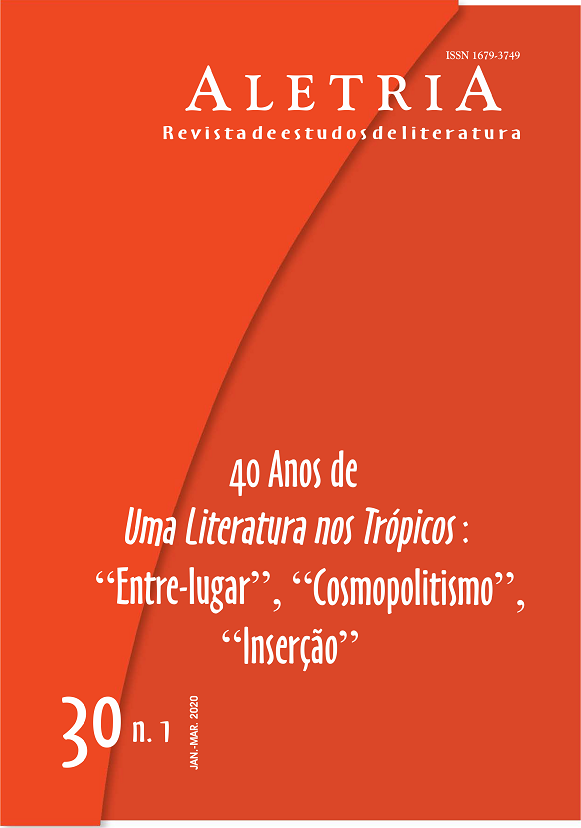Borges: Characteristics of Nationality, Nationalism Problems
DOI:
https://doi.org/10.17851/2317-2096.30.1.205-227Keywords:
Jorge Luis Borges, literary nationalism, gauchesca poetry, criollismo, Argentine literature, Latin American literatureAbstract
In order to understand how the discussion on literary nationality expressed in Jorge Luis Borges’ literary works, we analyse three different essays. They were written by the Argentine author between the 1920s-50s –“Queja de todo criollo” (1926), “Nuestro pobre individualismo” (1946) and “El escritor argentino y la tradición” (1953) – in which he debates problems related to nationalist views in Argentine literature, especially issues about criollismo, gauchesca poetry (with an emphasis on Martín Fierro, José Hernández’s epic) and the relations between Latin American writers and the European literary tradition. To better comprehend Borges’ position on the subject, we refer to the studies written by Antonio Candido (“Literatura e subdesenvolvimento”) and Silviano Santiago (“O entre-lugar do discurso latino-americano”) about the problems of imitation and assimilation in Latin American literatures. Lastly, we find in Machado de Assis precursory elements of Borges’ discussions, as those were pointed out by Leyla Perrone-Moisés in “Machado de Assis e Borges: nacionalismo e cor local”.
Downloads
References
ALENCAR, José de. Benção paterna. In: ______. Obra completa. Rio de Janeiro: Aguilar, 1959. v. 1, p. 691-701.
ASSIS, Machado de. Notícia da atual literatura brasileira. Instinto de nacionalidade. Disponível em: http://machado.mec.gov.br/obra-completa-lista/item/109-noticia-da-atual-literatura-brasileira-instinto-de-nacionalidade. Acesso em: 18 set. 2019.
BORGES, Jorge Luis. El escritor argentino y la tradición. In: ______. Discusión. Madrid: Alianza Editorial, 1997. p. 188-203.
BORGES, Jorge Luis. Inquisiciones / Otras inquisiciones. Buenos Aires: Debolsillo, 2012.
CANDIDO, Antonio. Literatura e subdesenvolvimento. In: ______. A educação pela noite. Rio de Janeiro: Ouro sobre Azul, 2006. p. 169-196.
CERVANTES, Miguel de. Dom Quixote de la Mancha. Tradução de Aquilino Ribeiro. São Paulo: Difusão Europeia do Livro, 1963.
CORTÁZAR, Julio. 62 Modelo para armar. Buenos Aires: Alfaguara, 1995.
FISHBURN, Evelyn; HUGHES, Psiche. Criollo. In: ______. A Dictionary of Borges. London: Duckworth, 1990. p. 65.
HERNÁNDEZ, José. El gaucho Martín Fierro y La vuelta de Martín Fierro. Buenos Aires: Editorial Betina, [199-?].
LIMA, Luiz Costa. Aproximação de Jorge Luis Borges. In: ______. O fingidor e o censor: no Ancien Régime, no Iluminismo e hoje. Rio de Janeiro: Forense-Universitária, 1988. p. 257-306.
PERRONE-MOISÉS, Leyla. Machado de Assis e Borges: nacionalismo e cor local. In: SCHWARTZ, Jorge (Org.). Borges no Brasil. São Paulo: Editora UNESP; Imprensa Oficial do Estado, 2001. p. 101-114.
SANTIAGO, Silviano. O entre-lugar do discurso latino-americano. In: ______. Uma literatura nos trópicos. Recife: Cepe, 2019. p. 9-30.
SARLO, Beatriz. Borges, un escritor en las orillas. Borges Studies Online. Pittsburgh: J. L. Borges Center for Studies & Documentation, 2001. E-book. Disponível em: https://www.borges.pitt.edu/bsol/bse3.php. Acesso em: 28 dez. 2019.
Downloads
Published
How to Cite
Issue
Section
License
Copyright (c) 2020 Newton de Castro Pontes (Autor)

This work is licensed under a Creative Commons Attribution 4.0 International License.
Authors who publish with this journal agree to the following terms:Authors retain copyright and grant the journal right of first publication with the work simultaneously licensed under a Creative Commons Attribution Non-Commercial No Derivatives License that allows others to share the work with an acknowledgement of the work's authorship and initial publication in this journal.Authors are able to enter into separate, additional contractual arrangements for the non-exclusive distribution of the journal's published version of the work (e.g., post it to an institutional repository or publish it in a book), with an acknowledgement of its initial publication in this journal.Authors are permitted and encouraged to post their work online (e.g., in institutional repositories or on their website) prior to and during the submission process, as it can lead to productive exchanges, as well as earlier and greater citation of published work (See The Effect of Open Access).





